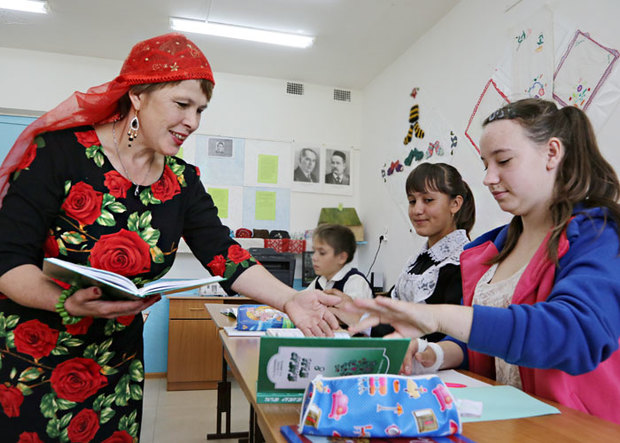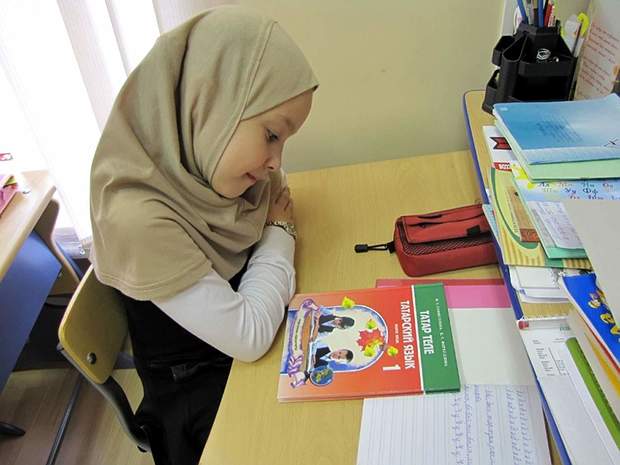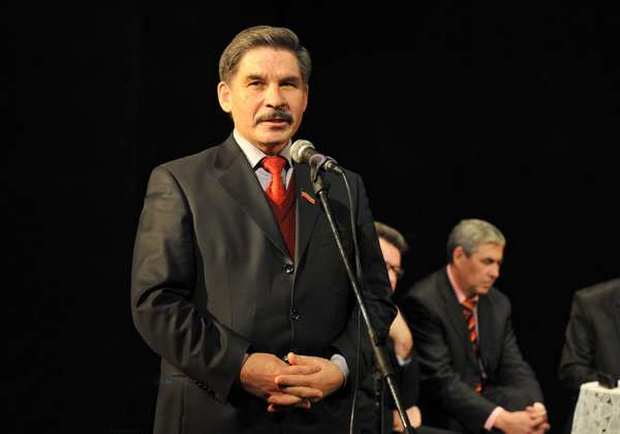‘I think that the same fate awaits the Tatars: they will say ‘I am a Tatar’ in Russian’
Realnoe Vremya began to speak Tatar: our compatriot from the USA explains in two languages whether the native language will die (with translation into English)
The statement of Deputy Minister of Culture of Tatarstan Guzel Sharipova that a Tatar don't have to speak the Tatar language has caused public excitement this week. Subsequently, the official denied his words. However, Robert Minnullin has recently said that a new generation of Tatars who do not speak the Tatar language may soon appear. We spoke with Lenar Mukhamadiev, an IT engineer, who is living in the US (Pittsburgh). He is confident that the officials should not make such harsh statements, however, in his opinion, the Tatar language is doomed to slow extinction.
"Әйдә, татар теле кирәкми инде" дип русча сөйләшеп йөрсәк, әлбәттә, татар теле үләчәк"
— Күптән тугел Татарстанның культура министры урынбасары Гүзәл Шәрипова татар булу татар телен белү белән генә бәйле түгел дип әйтеп үтте. Сезнеңчә түрәләр мондый фикер әйтергә мөмкинме?
— Миңа калса, әгәр син Татарстанда түрә вазыйфасында эшлисең икән, һәм канун буенча ике телне белү каралган икән, бу сүзләрне әйтү бераз сәеррәк яңгырый. Ләкин минемчә, күп түрәләр аның кебек уйлыйлыдыр, аларның моны ачыктан-ачык әйткәннәре генә юк.
— Ә сез үзегез бу фикергә ничек карыйсыз? Дөресме ул?
— Милләт белән тел бергә кушылып барган әйберләр. Ләкин кеше татар телен белмәсә, ул татар булудан туктамый. Аның сузләрендә бераз хаклык бар, ләкин барыбер татарлар күпләп яшәгән илдә, дәүләттә, күбесе татар телендә сөйләшкән вакытта, бу кешеләрне бераз үпкәләтә торган әйбер дип саныйм.
— Белүемчә, сез шулай ук «Татар теле юкка чыгарга мөмкин, чөнки ул дин белән бәйле түгел» дигән фикер әйткән идегез. Бу чыннан да шулаймы? Телне ничек саклап калырга була?
— Мин тел дин белән бәйле дип әйтмәдем. Без телләрне торгызу турында сөйләшә идек, һәм Израиль варианты килеп чыкты. Миңа бер дустым: «Менә Израильның бөтенләй теле юк иде, алар телләрен торгызалар, без дә шулай торгыза алабыз бит», — дип әйтте. Ә мин аңа болай дип җавап бирдем: «Израильдә ул беренче чиратта милләт теле итеп түгел, ә динне кайтарырга дигән максат белән торгызыла. Ә Коръән татар телендә язылмаган, Коръән гарәп телендә язылган. Әгәр кеше дини мөселман икән, аңа гарәп теле мөһимрәк. Минем еш кына шундый әйбер күзәткәнем бар – рус телле мөселманнар белән аралашасыз икән, алар гарәп телен татар теленнән өстен күрәләр.

«Татар теле, кызганычка каршы, вакыт белән уләчәк. Ләкин безнең максатыбыз — аның исәнлеген, аның яшәешен озаккарак сузу». gnkk.ru фотосы
Миңа калса бу бөтен дөньяда таралаган тенденция. Барыбер телләр үлеп бара бит инде. Кызганычка каршы, татар теленең бернинди уникальллеге дә, дөньяга бирерлек зур татар телендә язылган тарихи китаплар да, кешеләрне шакккатырылык фәнни эшләр, татар телендә язылган әйберләр дә юк диярлек. Күпчелек кеше барыбер дөньядагы 4-5 телдә – инглиз телеме, рус телеме, кытай телеме – сөйләшә. Мин Индия, Ирландия мисалын китерер идем. Алар барыбер күбесенчә инглиз телендә сөйләшә, балалары инглизчә сөйләшеп үсә. Элеккеге постсовет республикаларында да күп кешегә милләт телендә түгел, ә русча аралашырга кулайрак,.
Татар теле, кызганычка каршы, вакыт белән уләчәк. Ләкин безнең максатыбыз — аның исәнлеген, аның яшәешен озаккарак сузу. Әгәр „Әйдә, татар теле кирәкми инде" дип русча сөйләшеп йөрсәк, әлбәттә, татар теле үләчәк. Шуңа күрә телгә игътибар итәргә кирәк, телне күпчелек яңа өлкәләр белән баетырга кирәк. Мәсәлән, татар телендә фәнни эшләр язырга, татар телен авыл, колхоз культурасы, әби теле, концертлар теле итеп кенә кабул итәргә ярамый, ул шәһәр культурасы теле булырга тиеш. Татар телендә бит кеше шәһәрдә аралаша. Алайса кешеләрдә стереотип бар — алар татар телендә сөйләшү, татар телендә аралашуны „колхоз", „әби", „печән", „сөтле чәй" дәрәҗәсенә кайтарып куя. Ләкин татар теле көнкүреш теле генә түгел, ул фәнни тел дә, ул шәһәр теле дә, ул музыка теле дә – күп функцияләре бар аның. Миңа калса, татар теленең проблемасы шунда ки, ул аз функцияләрне генә үти.
«Миңа калса татар халкын да шундый ук язмыш көтә – алар да «Мин татар» дип урыс телендә әйтеп йөриячәкләр»
— Аңлавымча, сез Канадада да булгансыз. Анда нинди дә булса биллингвизм мисаллары күргәнегез булдымы?
— Канада күп телләрдә сөйләшә. Мәсәлән, илнең төньягында халыклар үз телләрендә аралаша. Ләкин Канадада иң популяр телләр – инглиз һәм француз теле. Француз теле күбрәк Квебек провинциясендә таралган. Хәтта ки барлык язулар ике телдә, француз һәм инглиз телендә бирелсә дә, кеше Квебектан кала башка шәһәрләрдә барыбер инглиз телендә аралаша. Француз телен Канадада якынча 25% кеше беләдер мөгаен. Канада дәүләте узенчә француз телен белүчеләрне хуплый. Мәсәлән, әгәр дә син француз телен белсәң, синең хезмәт хакың югарырак булачак. Әгәр дә татар теле өчен дә шундый эксперимент эшләсәң, минемчә, бик кызык булыр иде: татар телен белсәң, хезмәт хакың артык булачак. Барыбер ниндидер мотивация булырга тиеш.
— Ә сез Америкада ирландлылар белән аралашасызмы? Анда ирланд телендә сөйләшүче ирлландлылар бармы?
— Американың гомумән бик зур проблемасы бар – монда кешеләр күкрәкләрен кагып «Мин поляк" яки «Мин немец» дип әйтергә яраталар, ләкин үз телләрендә бер-ике җөмлә дә төзи алмыйлар, бөтенләй сөйләшмиләр диярлек, яки бары тик аңлыйлар гына. Мин белгән кешеләр ирланд телендә сөйләшмиләр. Америкада ирланд телен белүчеләр саны 10% чамасы. Яшьләре бигрәк тә телне белмиләр. Алар үзләрен американлылар дип саный. Башка милләтләр теле алар өчен әбиләр теле. Аларның әбиләре сөйләшкән, аларның башларында шулай әбиләр теле булып калган, алар аны практик яктан кулланмыйлар диярлек. Алар инглиз телендә сөйләшә, ул уңайлы, аны бөтен кеше дә аңлый. Алар үз телләрендә сөйләшүнең мәгънәсен күрмиләр, ләкин шуңа карамастан алар «Мин ирланд», «Мин шотланд» диләр, флаглар асып куялар. Миңа калса татар халкын һәм гомумән Россиядагы башка халыкларны да шундый ук язмыш көтә – алар да «Мин татар» дип урыс телендә әйтеп йөриячәкләр. Ә татар теле алар өчен, әби теле, колхоз теле, телевидение концертлары теле булып калчак.

«Канада күп телләрдә сөйләшә. Мәсәлән, илнең төньягында халыклар үз телләрендә аралаша. Ләкин Канадада иң популяр телләр – инглиз һәм француз теле». mvasin.org.ua фотосы
«Читкә киткән кешеләр милләткә әллә нинди зур үрнәк тә була алмый, зур йогынты да ясый алмый»
— Берәр Америка диаспорасын яки модельны сез татарлар өчен дә идеальвариант дип әйтә аласызмы?
— Модель бер генә, һәм ул күптәнге модель – татар теленә инфраструктара кирәк: телевидение, китаплар һәм башкалар. Татар теле күп күптөрле өлкәләрне колачларга тиеш – медицинаны, фәнне. Татар телен практик яктан кулларнырга кирәк. Тел куп функцияле булырга тиеш. Ул шул очракта гына яшәячәк. Әлбәттә, татар мәктәпләре, татар балалар бакчалары турында әйтеп тә торасы юк.
— Украиналылар Америкада яки Канадада үзләренең телләрен беләләрме, саклап кала алганнармы?
— Украиналылар башка милләтләр белән чагыштырганда алар соң килделәр – алар әле 50-нче елларда, сугыштан соң гына күченә башладылар. Ләкин минем белүемчә, Канадада бик зур украин диаспорасы бар. Алар да украиналылыклары белән горурланып йөриләр, ләкин алар да көнкүрештә инглиз телен кулланалар.
— Ә нигә шундый ситуация барлыкка килә?
— Глобализация ул Америкада, Канадада башланган әйбер. Монда ул аеруча зур масштабта бара. Вакыт узу белән доньяда биш-алты тел генә калачак.
— Америка татарлары үзара татарча сөйләшәме?
— Төрлесе бар – татарча сөйләшкәннәре дә, татарча аңлаганнары, ләкин сөйләшмәгәннәре, татарча аңламаганнары һәм сөйләшмәгәннәре бар.
— Ниндиләре күбрәк?
— Бертигез дип уйлыйм. Ким дигәндә татарча күбесе аңлый.
— Американлы татар теленә генә хас үзенчәлекләр бармы?
— Мондагы татар диаспорасы әле яшь. Әлегә татар теленә хас үзенчәлекләр бар дип әйтә алмыйм. Без әле чагыштырмача соң килә башладык – 50-60-нчы елларда. Анысы билгеле инде, татар сүзләре барыбер инглиз сүзләре белән кушыла. Мәсәсәлән, татар телендә андый сүз юк, ә инглиз телендә андый сүз бар һәм аны инглизчә аңлатуы җайлырак. Кушып сөйләшү бар – үзебез дә сизмәстән татарча һәм инлгизчәне кушып сөйләшәбез, ә Рәсәйдән килгән русча белүчеләр русча да кушып сөйләшәләр. Чиста әдәби телдә сөйләшүчеләр бик аз инде. Барыбер кайда яшәүгү карап шул илнең йогынтысын тоясың.
— Күптән түгел «Татар-информ»га биргән интервьюсында Роберт Миңнуллин «Без чит илдә яшәгән татарларга ышанырга ярамый — алар „Туган тел" җырын җырлыйлар, өчпочмаклар пешерәләр, ләкин без беренче чиратта Татарстанда, Башкорстанда яшәүче татарларны истә тотарга тиеш, милләтнең киләчәге алардан тора» дигән фикер әйтте. Сез моның белән килешәсезме?
— Мин бу фикер белән киллешәм, чөнки без милләт өчен югалган димәсәк тә, әгәр татарлар үзләренең дәүләтләрендә, автономияләрендә аларның хокукларының саклануын теләсәләр, алар үзләренең туып-үскән җирләрендә, тарихи ватаннарында яшәргә тиеш.
Мин Роберт абый сүзе белән килешәм, барыбер киткән кешеләр милләткә әллә нинди зур үрнәк тә була алмый, зур йогынты да ясый алмый. Без татарча сөйләшә, балаларга татар телен өйрәтә һәм монда татар тормышы алып бара, төрле чаралар оештыра алабыз. Мондагы яшьләр үзара аралаштылар, өйләнештеләр. Татар егетләре американкаларга өйләнмәскә, татар кызлары американнарга һәм башка милләт вәкилләренә кияүгә чыкмаска тырыша ала – без шуның турында гына кайгырта алабыз, без глобаль, дәүләткә кагылышлы мәсәләләрне хәл итә алмыйбыз.

«Мин Роберт абый сүзе белән килешәм, барыбер киткән кешеләр милләткә әллә нинди зур үрнәк тә була алмый, зур йогынты да ясый алмый». evening-kazan.ru фотосы
Роберт абый хаклы, чөнки күпчелек татар халкы барыбер Идел буенда, Поволжьеда, яши һәм әлбәттә шул якка игътибарны күбрәк юнәлтергә кирәк, татар теленең статусын, татарларның хокукларын шул җирлектә кайгыртырга кирәк.
'If we say that the Tatar language is no longer necessary and we begin to speak only in Russian, of course, the Tatar language will die'
Deputy Minister of Culture of Tatarstan Guzel Sharipova has recently stated that one doesn't have to speak the Tatar language to be a Tatar. In your opinion, can the officials afford to make such statements?
I think that if you are a civil servant in Tatarstan, and the law provides for bilingualism, these words sound strange. But, in my opinion, many officials think the same way, they just do not tell it openly.
What do you think about this statement? Do you agree with it?
Nation and language are inseparably linked. But if a person does not speak the Tatar language, they do not cease to be Tatars. Her words are fair, nevertheless, in the country where many people speak the Tatar language such statements hurt people.
As far as I know, you said that the Tatar language may disappear because it is not associated with the religion. Is it really so? How can we save the language?
I never said that language is associated with the religion. We talked about the restoration of the languages, and cited Israel. A friend of mine said: 'Israel did not have a language, they are restoring it, so we can also restore our language.' I answered that in Israel, Hebrew in the first place is not the national language, and they are restoring it in order return the religion. And the Koran was not written in the Tatar language, the Koran was written in Arabic. If a person is a staunch Muslim, Arabic is more important to them. I often observe the following — Russian Muslims prefer Arabic to the Tatar language.

The Tatar language, unfortunately, will eventually die. Our task is to prolong its life. Photo: komanda-k.ru
I believe that this is a global tendency. Anyway, languages are dying. Unfortunately, we can say that the Tatar language has no uniqueness, there are no historical books written in the Tatar language, there is neither significant scientific works nor some other things. Most people in the world speak 4-5 languages including English, Russian, or Chinese. I would cited India or Ireland. The majority of the population still speak English, their children grow up speaking English. In the former Soviet republics people prefer to speak Russian rather than the national languages.
The Tatar language, unfortunately, will eventually die. Our task is to prolong its life. If we say that the Tatar language is no longer necessary and we begin to speak only in Russian, of course, the Tatar language will die. So you need to pay attention to it, it should be used in many areas — for example, to write research works in the Tatar language. It is impossible to perceive it only as the language of the village grandmothers and Tatar concerts. It should also be a language of urban culture because in the cities people communicate on it. People have a stereotype — they put communication in the Tatar language to the level of 'kolkhoz', 'grandmother', 'hay', 'tea with milk'. However, it is not only everyday language but also the language of science, city, music — it has a lot of functions. I believe that the problem of the Tatar language is that it performs only specific functions.
'I think that the same fate awaits the Tatars: they will say 'I am a Tatar' in Russian'
As far as I understand, you were in Canada. Have you ever met any examples of bilingualism there?
Canada speaks many languages. For example, in the north of the country people try to communicate in their language. But the most popular languages in Canada — English and French. The French language is more spoken in the province of Quebec. Despite the fact that all the inscriptions are in two languages — English and French in the cities, except Quebec. People speak English. Perhaps, about 25% of the population speak the French language in Canada. At the same time, the Canadian government encourages the citizens speaking French. For example, if you speak French, your salary will be higher. I think it would be interesting to conduct the same experiment in Tatarstan: if you speak the Tatar language — and then your salary will be higher. There should be some motivation.
In America, do you communicate with the Irish? Are there Irish people who speak the Irish language?
In America, there is a very big problem in general — people here love to say 'I'm a Polish' or 'I'm a German'. But they can't say even one or two sentences in their language, the Tatars generally do not speak the Tatar language, they only understand it. The people I know don't speak Irish. The number of people who know the Irish language in America is about 10%. In the first place, it is the youth who do not speak their language. They consider themselves Americans. The language of other peoples to them — the language of grandmothers. Their grandmother spoke in them, and in their memory it has left as a language of the grandmothers, we can say that they don't practice. They speak English, it's convenient because everyone understands. They don't see sense to speak in their native language, but despite this, they say 'I'm an Irish', 'I'm a Scottish'. They hang their flags. I think that the same fate awaits the Tatars and the other peoples of Russia — they will also say: 'I am a Tatar' in Russian. And the Tatar language will remain the language of the grandmothers to them, the language of the village, the language of television concerts.

'Canada speaks many languages. For example, in the north of the country people try to communicate in their language. But the most popular languages in Canada — English and French.' Photo: mvasin.org.ua
'People who moved abroad, cannot become an example and cannot have much influence'
Can you name one of the American diasporas or models as an example for the Tatars?
There is only one model and this model has been existing for a long time. The Tatar language needs infrastructure: TV, books, etc. The Tatar language should cover different areas such as medicine, science. The Tatar language should be multi-functional and widely used. Only in this case, it will live. Say nothing of the Tatar schools and kindergartens.
Ukrainians who live in America and in Canada, do they speak their native language? How have they managed to preserve it?
Ukrainians in comparison with other nationalities came later, they began to move only in the 1950s after the war. But as far as I know, Canada has a very large Ukrainian diaspora. They are also proud that they are Ukrainians, but in daily life they use English.
Do the American Tatars speak Tatar with each other?
It depends: there are those who speak Tatar, there are those who understand Tatar but do not speak it, there are those who do not understand and do not speak Tatar.
What group is more numerous?
I think majority at least understand Tatar.
Are there any peculiarities that are characteristic only of the American Tatars?
The local Tatar diaspora is still quite young. I can't say that now there are already some features. We started to arrive relatively late — in the 1950-1960s. Of course, the Tatar words are mixed with English ones. For example, in the Tatar language there is no a certain word, but in English it is and it is easier to explain this concept in English. Without thinking, we mix the Tatar and English languages, and those who come from Russia and know the Russian language, they stick even Russian words. Those who speak pure literary Tatar language are few. You will experience linguistic influence depending on the country where you live.
Robert Minnullin has recently said in his interview to Tatar-inform that it is impossible to hope for Tatars living abroad, they sing Tugan tel (Native language – translation from Tatar), cook triangles, but the fate of the Tatar nation is determined by the Tatars living in Tatarstan and Bashkortostan. Do you agree with this opinion?
I agree with this opinion because, even if we're not talking about the fact that we are lost for the nation, anyway, if the Tatars want their rights were respected in their state, their autonomy, they have to live on the land where they were born and raised, where their historical homeland is.
I agree with the words of Robert Minnullin, one way or another, people who moved abroad, cannot become an example and cannot have much influence. In their turn, we can only speak Tatar, to teach our children, lead a certain lifestyle, to organise various events. We can care that the Tatars did not marry American women, and Tatar didn't marry Americans and representatives of other nationalities. But we can't solve global issues.

'I agree with the words of Robert Minnullin, one way or another, people who moved abroad, cannot become an example and cannot have much influence.' Photo: taratorim.ru
Robert Minnullin is right because the majority of the Tatars live in the Volga Region that is why we should pay attention to them, in the first place we should care about the status of the Tatar language and the rights of the Tatars here.